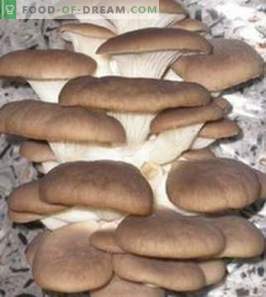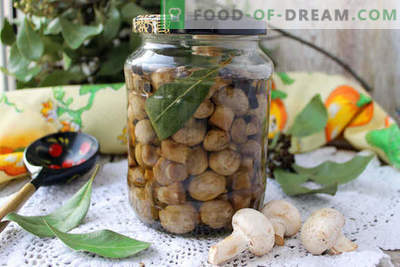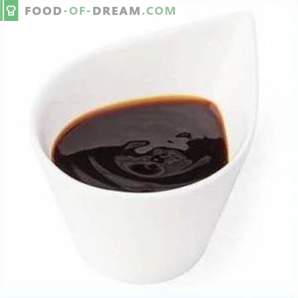
Oyster mushrooms - a very common and favorite food product. They are eaten in any form: boiled, fried, dried, pickled. Wild oyster mushroom is more fragrant, but there is always the risk of collecting very similar poisonous mushrooms instead of edible mushrooms. The oyster mushroom cultivated by man is somewhat inferior to wild forms in taste and content of nutrients, but you can be absolutely sure of its safety for health.
Let us take a closer look at what exactly is included in the composition of valuable mushrooms, what properties they possess, about their benefits and harm to the body.
Calories and composition
Oyster mushrooms have a low calorie content - from 38 to 42 kcal per 100 grams. masses.
Ripe oyster contains from 15 to 25% of easily digestible protein. Fat in it is small - only 2, 2 mg per 100 g. dry mushrooms. But more than 67% of them are extremely useful polyunsaturated fatty acids. The amount of carbohydrates is very significant - up to 75% of the dry mass. Among them, polysaccharides, mannitol and chitin are considered especially valuable. Mushrooms also contain sucrose, fructose and glucose. Statins, substances that prevent the formation of cholesterol plaques, were found in the oyster mushroom.
Mushrooms contain many minerals: copper, potassium, iron, cobalt, iodine, zinc, calcium, selenium and other elements.
Oyster mushroom - useful properties
Oyster not only has excellent taste, it is also very useful. These mushrooms are a real storehouse of proteins, amino acids and minerals. According to these indicators, they are not inferior to meat products, and surpass many vegetable crops in carbohydrate content. Properly cooked oyster mushroom is a complete dish, which is especially appreciated by supporters of vegetarian food.
Fruit bodies contain many B, C, and E vitamins, as well as D2. Of all the mushrooms, it is in the oyster mushroom that there is the most vitamin PP, which is responsible for the metabolism and directly influences the microcirculation of the blood. Its regular use reduces the level of cholesterol in the blood, normalizes metabolism and improves blood circulation.
Fiber of mushrooms possesses excellent absorbent properties. Oyster mushroom removes toxins, radionuclides and excess fluid from the body. These mushrooms are a powerful tool in the fight against malignant and benign tumors. Not for nothing, many modern anti-cancer drugs include oyster mushroom extract or its powder.
Unique mushrooms inhibit the development of atherosclerosis, and their juice has an antibacterial, anti-inflammatory effect and effectively fights E. coli. Due to the low calorie content, oyster mushroom is classified as a dietary product and doctors often recommend it to people who are overweight.
Important to know! Not only good ...
Despite all of the above advantages, oyster mushroom can harm health. The fact is that it contains chitin - a special substance that is not absorbed by the body without heat treatment. It is chitin that is responsible for the excellent absorbent properties of mushrooms. By eating a raw or half-baked product, a person risks “earning” kidney, liver, and stomach disease.
Oyster mushroom is a fairly heavy meal for children, the elderly and people with a sore stomach. Given this, it should be included in their diet in small quantities, or completely excluded from it. Otherwise, you can provoke nausea, flatulence or diarrhea. Like any other food product, oyster mushroom (or rather, its spores) can cause allergies.
Avoiding trouble is easy: always expose the mushrooms to thorough heat treatment, and trying them for the very first time will be sufficiently limited to 2-3 slices (a kind of testing for an allergic reaction). Do not even abuse the dishes of oyster mushroom - even without causing harm to the body, such a “mushroom” diet will eventually cause unpleasant heaviness in the stomach.























